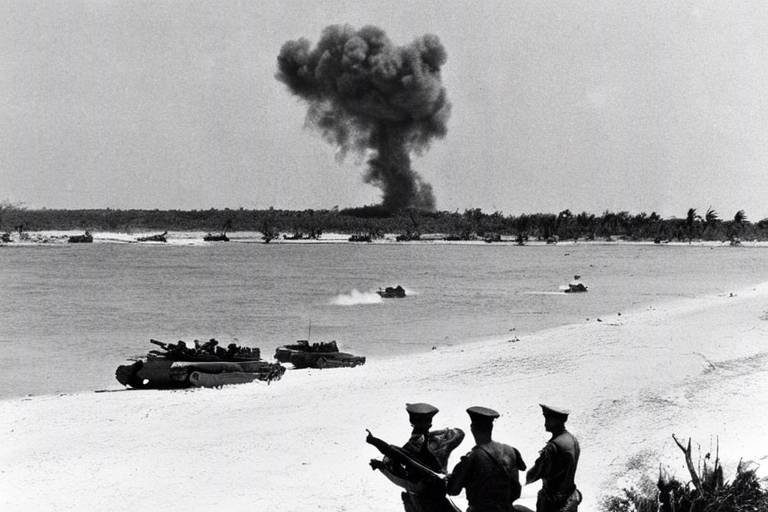The Bay of Pigs Invasion - A Failed Operation
Exploring the historical significance and consequences of the Bay of Pigs invasion, a failed operation that took place in 1961, shaping US-Cuban relations and Cold War dynamics.
Understanding the political context and motivations behind the planning and execution of the Bay of Pigs invasion by the CIA and anti-Castro Cuban exiles.
Detailing the logistical aspects and strategic planning involved in organizing the invasion, including training, weaponry, and operational tactics.
Examining the actual events of the invasion, from the landing at the Bay of Pigs to the subsequent military engagements and challenges faced by the invaders.
Analyzing the global response to the Bay of Pigs invasion, including the roles played by the Soviet Union, Latin American countries, and the United Nations.
Discussing the immediate and long-term consequences of the failed operation on US foreign policy, Cuban relations, and the broader Cold War dynamics.
Reflecting on the lessons learned from the Bay of Pigs invasion in terms of intelligence failures, military planning, and the implications for future covert operations.
Exploring the lasting impact of the Bay of Pigs invasion on US-Cuban relations, Cuban exile communities, and the perception of US interventionism in Latin America.
Considering the ongoing historical debates, controversies, and revisionist perspectives on the Bay of Pigs invasion and its place in Cold War history.

Origins of the Invasion
Exploring the historical significance and consequences of the Bay of Pigs invasion, a failed operation that took place in 1961, shaping US-Cuban relations and Cold War dynamics.
Understanding the political context and motivations behind the planning and execution of the Bay of Pigs invasion by the CIA and anti-Castro Cuban exiles.
The origins of the Bay of Pigs invasion can be traced back to the rise of Fidel Castro in Cuba and the subsequent deterioration of relations between the United States and the new Cuban government. Following the Cuban Revolution in 1959, Castro's alignment with the Soviet Union and his nationalization of American assets in Cuba heightened tensions with the US. The Eisenhower administration, concerned about the spread of communism in the Western Hemisphere, approved a plan to overthrow Castro's regime.
The Central Intelligence Agency (CIA) took the lead in orchestrating the invasion, recruiting and training Cuban exiles who had fled Castro's regime. These exiles, motivated by a desire to overthrow Castro and restore democracy in Cuba, formed the core of the invasion force. The CIA saw an opportunity to remove a perceived threat to US interests in the region and regain influence in Cuba through a covert military operation.
As the planning for the invasion progressed, it became clear that the operation was driven by a combination of political, ideological, and strategic considerations. The US government viewed Castro as a communist threat in its backyard, and the anti-Castro exiles saw the invasion as a chance to reclaim their homeland from what they perceived as a tyrannical regime. The convergence of these motives set the stage for the Bay of Pigs invasion.
Furthermore, the Cold War context of the time, with the US and the Soviet Union locked in a global struggle for influence, added another layer of significance to the invasion. The US saw Cuba under Castro as a Soviet proxy in its sphere of influence, leading to heightened fears of communist expansion in the Western Hemisphere. The Bay of Pigs operation was thus seen as a crucial battleground in the larger Cold War conflict.
In conclusion, the origins of the Bay of Pigs invasion lie in the complex interplay of political interests, ideological motivations, and Cold War dynamics. The planning and execution of the operation were shaped by a web of factors that reflected the intense geopolitical rivalries of the time.

Logistics and Planning
Exploring the historical significance and consequences of the Bay of Pigs invasion, a failed operation that took place in 1961, shaping US-Cuban relations and Cold War dynamics.
When delving into the logistics and planning of the Bay of Pigs invasion, one must understand the intricate details that went into organizing such a covert operation. The Central Intelligence Agency (CIA) spearheaded the planning alongside Cuban exiles who were vehemently opposed to Fidel Castro's regime. The operation was meticulously crafted to overthrow Castro and his government, aiming to establish a pro-US regime in Cuba.
The logistical aspects of the invasion were vast and complex. Training camps were set up in Guatemala, where the Cuban exiles underwent intensive military training to prepare for the mission. Weapons and equipment were carefully procured and smuggled into Cuba to support the invading forces. The CIA strategized various operational tactics, including the timing of the attack and the coordination of air support.
Moreover, the planning phase involved detailed intelligence gathering to assess the strengths and weaknesses of Castro's military forces. The CIA believed that the Cuban population would rise up in support of the invaders, a miscalculation that would later prove to be a critical flaw in the operation.
As the invasion date approached, the logistical challenges became more pronounced. Communication issues, lack of adequate air support, and poor coordination among the invading forces plagued the operation from the outset. These logistical shortcomings would ultimately contribute to the failure of the Bay of Pigs invasion.

Execution of the Operation
When it came to the execution of the Bay of Pigs operation, the CIA and the Cuban exiles faced numerous challenges and setbacks. The invasion, which was intended to overthrow Fidel Castro's regime, began on April 17, 1961, with a landing at the Bay of Pigs in Cuba. However, from the outset, things did not go as planned.
The invaders, consisting of around 1,400 Cuban exiles, were met with strong resistance from Castro's forces. The element of surprise that was crucial for the success of the operation was lost early on, leading to a chaotic and disorganized landing. The invaders found themselves outnumbered and outgunned, facing fierce opposition from Cuban military forces.
Despite initial setbacks, the invaders managed to establish a beachhead at the Bay of Pigs. However, they were soon surrounded and pinned down by Castro's troops, unable to advance further inland. The lack of air support and the failure of promised reinforcements further weakened their position.
As the operation unfolded, it became clear that the invaders were not receiving the support they had been led to expect. Communication breakdowns, logistical errors, and a lack of coordination among the invading forces contributed to the overall failure of the mission. The Cuban exiles found themselves isolated and vulnerable, unable to sustain the momentum needed to achieve their objectives.
Ultimately, the Bay of Pigs invasion ended in disaster for the CIA and the Cuban exiles. The operation was a resounding failure, resulting in the capture or death of many of the invaders. The botched invasion had far-reaching consequences, not only for the individuals directly involved but also for US-Cuban relations and the broader geopolitical landscape of the Cold War.

International Reactions
The Bay of Pigs invasion in 1961 triggered a flurry of international reactions that reverberated across the globe. As news of the failed operation spread, the Soviet Union seized the opportunity to condemn the United States for its covert intervention in Cuba. The event served as a propaganda victory for the Soviets, highlighting American aggression and imperialism in the eyes of many nations.
Latin American countries, particularly those aligned with the Non-Aligned Movement, expressed solidarity with Cuba and denounced the invasion as a violation of sovereignty. This show of support further isolated the United States in the region and strained diplomatic relations with key allies.
At the United Nations, the Bay of Pigs invasion sparked heated debates and discussions on the principles of self-determination and non-interference in the affairs of sovereign states. The event underscored the fragility of international relations during the Cold War era and fueled tensions between the superpowers.
Moreover, the Bay of Pigs invasion prompted a reassessment of U.S. foreign policy in the Western Hemisphere, leading to a shift in global perceptions of American interventionism. The failed operation exposed the risks and complexities of covert military actions and raised concerns about the potential for escalation and conflict on a global scale.

Consequences and Aftermath
Exploring the historical significance and consequences of the Bay of Pigs invasion, a failed operation that took place in 1961, shaping US-Cuban relations and Cold War dynamics.
Following the disastrous outcome of the Bay of Pigs invasion, the consequences and aftermath reverberated across the geopolitical landscape, leaving a lasting impact on various fronts. The failed operation dealt a significant blow to the reputation of the United States on the global stage, exposing the vulnerabilities of covert intervention and sparking intense scrutiny of US foreign policy.
Internationally, the invasion led to heightened tensions between the US and the Soviet Union, escalating the already precarious Cold War dynamics. The Soviet response to the invasion further exacerbated the antagonistic relationship between the two superpowers, pushing them closer to the brink of direct confrontation.
Domestically, the failure of the Bay of Pigs operation had profound repercussions on the Kennedy administration, highlighting the perils of unchecked executive power and the dangers of relying on clandestine operations without thorough consideration of potential outcomes. The public backlash and scrutiny that followed the botched invasion forced a reevaluation of US foreign policy strategies and a recalibration of intelligence operations.
Furthermore, the aftermath of the Bay of Pigs invasion significantly altered the course of US-Cuban relations, solidifying the animosity between the two nations and setting the stage for decades of hostility and diplomatic standoffs. The failed operation served as a stark reminder of the complexities and risks inherent in interventionist policies, shaping the approach of future administrations towards Latin America and beyond.
In the broader context of the Cold War, the consequences of the Bay of Pigs invasion underscored the need for strategic foresight, diplomatic finesse, and multilateral cooperation in navigating the intricate web of global power dynamics. The lessons learned from the failed operation prompted a reevaluation of US foreign policy priorities and a reassessment of the efficacy of covert operations in achieving long-term strategic goals.

Lessons Learned
When reflecting on the Bay of Pigs invasion, it becomes evident that numerous lessons were learned from this failed operation. One of the key takeaways was the critical importance of intelligence accuracy and reliability in planning covert operations. The invasion highlighted the severe consequences of misjudgments and misinformation in intelligence assessments, leading to a flawed understanding of the situation on the ground.
Furthermore, the Bay of Pigs invasion underscored the necessity of comprehensive military planning and adequate training for all personnel involved in such operations. The lack of effective coordination and preparedness among the invaders significantly hampered the execution of the mission, contributing to its ultimate failure.
Another crucial lesson derived from this historical event was the importance of understanding the political and social dynamics of the target region. The invasion exposed the limitations of relying solely on military intervention without considering the broader implications and potential repercussions of such actions.
Moreover, the Bay of Pigs invasion served as a stark reminder of the risks associated with covert operations and the unpredictability of international responses. The backlash and condemnation faced by the United States following the failed mission highlighted the diplomatic challenges and strategic implications of engaging in clandestine activities.

Historical Legacy
The Bay of Pigs invasion left a deep historical legacy that continues to shape US-Cuban relations and perceptions of US interventionism in Latin America. The failed operation marked a significant turning point in Cold War history, highlighting the complexities and risks of covert military interventions. It solidified Fidel Castro's grip on power in Cuba and intensified anti-American sentiments in the region.
Moreover, the Bay of Pigs invasion fueled the growth of Cuban exile communities in the United States, leading to the establishment of a vocal and influential diaspora that continues to advocate for a hardline stance against the Cuban government. The event also underscored the limitations of US intelligence agencies and the need for more effective coordination and oversight in covert operations.
From a broader perspective, the historical legacy of the Bay of Pigs invasion serves as a cautionary tale for policymakers and military strategists, highlighting the importance of thorough planning, accurate intelligence, and clear objectives in any military endeavor. It stands as a reminder of the unpredictable and often unintended consequences of foreign interventions and the enduring impact of historical mistakes on diplomatic relations.

Revisiting the Bay of Pigs
Revisiting the Bay of Pigs takes us back to a pivotal moment in history that continues to spark debates and controversies. Over the years, historians and scholars have delved deep into the intricacies of the failed invasion, offering new perspectives and insights that challenge conventional narratives. The hindsight provided by decades of analysis allows us to reexamine the decisions made, the strategies employed, and the consequences faced.
One of the key aspects of revisiting the Bay of Pigs is the exploration of alternative scenarios that could have unfolded. What if different choices were made? How might history have been altered? These hypothetical scenarios shed light on the complexities of international relations and the unpredictable nature of warfare. By revisiting the Bay of Pigs, we are not just revisiting the past but also reevaluating our understanding of power dynamics and political maneuvering.
Moreover, revisiting the Bay of Pigs invites us to reflect on the enduring lessons that can be drawn from this historical episode. The mistakes and missteps made during the invasion serve as cautionary tales for future generations, highlighting the importance of thorough planning, intelligence assessment, and diplomatic foresight. By learning from the past, we can strive to avoid repeating the same errors in judgment and execution.
Furthermore, the ongoing revisionist perspectives on the Bay of Pigs challenge traditional narratives and seek to uncover hidden truths and motivations. As new evidence comes to light and previously overlooked details emerge, the story of the invasion continues to evolve, prompting us to question our assumptions and biases. Revisiting the Bay of Pigs is not just an exercise in historical analysis but a journey of discovery and reinterpretation.
Frequently Asked Questions
- What was the Bay of Pigs invasion?
The Bay of Pigs invasion was a failed military operation conducted by the CIA and Cuban exiles in 1961, aimed at overthrowing the Cuban government led by Fidel Castro.
- Why was the Bay of Pigs invasion significant?
The invasion had significant consequences on US-Cuban relations and Cold War dynamics, leading to increased tensions between the US and the Soviet Union.
- Who was involved in planning the Bay of Pigs invasion?
The CIA and anti-Castro Cuban exiles were primarily involved in planning and executing the invasion, with the support of the US government.
- What were the international reactions to the Bay of Pigs invasion?
The invasion sparked global reactions, with the Soviet Union supporting Cuba, Latin American countries condemning the US intervention, and the United Nations discussing the situation.
- What were the consequences of the Bay of Pigs invasion?
The failed operation had immediate and long-term consequences on US foreign policy, Cuban relations, and the broader Cold War landscape.
- What lessons were learned from the Bay of Pigs invasion?
The invasion highlighted intelligence failures, military planning shortcomings, and the need for better coordination in future covert operations.



















